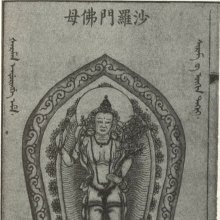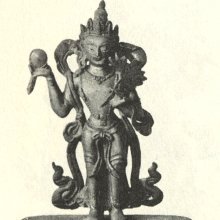Shramana, Śramaṇa: 18 definitions
Introduction:
Shramana means something in Buddhism, Pali, Hinduism, Sanskrit, Jainism, Prakrit, the history of ancient India, Hindi. If you want to know the exact meaning, history, etymology or English translation of this term then check out the descriptions on this page. Add your comment or reference to a book if you want to contribute to this summary article.
Shramana has 18 English definitions available.
The Sanskrit term Śramaṇa can be transliterated into English as Sramana or Shramana, using the IAST transliteration scheme (?).
Images (photo gallery)
Languages of India and abroad
Sanskrit dictionary
[Deutsch Wörterbuch]
Source: Cologne Digital Sanskrit Dictionaries: Böhtlingk and Roth Grosses Petersburger WörterbuchŚramaṇa (श्रमण):—(von 1. śram) mit kṛta u. s. w. componirt gaṇa śreṇyādi zu [Pāṇini’s acht Bücher 2, 1, 59.]
1) adj. der sich abmüht, kasteit; m. Bettelmönch, insbes. ein buddhistischer, Buddhist überh. (Gautama selbst erhält dieses Beiwort) [Trikāṇḍaśeṣa 1, 1, 24.] [Hemacandra’s Abhidhānacintāmaṇi 75.] [Anekārthasaṃgraha 3, 227.] [Medinīkoṣa ṇ. 80] (nach [Hemacandra’s Anekārthasaṃgraha] und [Medinīkoṣa] auch = nindyajīvin). [Halāyudha 2, 190.] [Colebrooke 2, 196. 203.] [WILSON, Sel. Works 1, 295. 303. 2, 312. fgg.] [BURNOUF, Intr. 78. 275. fg. 297.] [Lassen’s Indische Alterthumskunde 2, 238. 263. 449.] [The Śatapathabrāhmaṇa 14, 7, 1, 22.] [Taittirīyāraṇyaka] in [Weber’s Indische Studien 1, 78.] śramaṇāśca vanaukasaḥ [Mahābhārata 1, 7778] [Rāmāyaṇa 1, 13, 13 (11 Gorresio).] gaṇa yuvādi zu [Pāṇini’s acht Bücher 5, 1, 130.] [Bhāgavatapurāṇa 5, 3, 20. 11, 2, 20. 12, 3, 19.] [Kathāsaritsāgara 27, 18. 38, 56. 51, 118. fgg. 53, 39. 65, 132. 75, 37. 39.] [Varāhamihira’s Bṛhajjātaka S. 87, 9] (v. l. für śravaṇa). [Rājataraṅgiṇī 1, 199. 5, 427.] [Sāhityadarpana 103, 12.] [Rgva tch’er rol pa ed. Calc. 2, 20. 308, 6. 14. 309, 20. 318, 18. 320, 6. 7. 20.] [WASSILJEW 63. 83. 212. 248.] Vie de [Hiouen-Thsang 62.] śramaṇā f. [Trikāṇḍaśeṣa 3, 3, 141.] [Hemacandra’s Abhidhānacintāmaṇi 532,] [Scholiast] [Halāyudha 2, 332.] [Rāmāyaṇa 1, 1, 55 (59 Gorresio).] [MAHĀVĪRAC. 80, 12. fgg.] kumāra [Pāṇini’s acht Bücher 2, 1, 70. 6, 2, 26.] śramaṇī [Rāmāyaṇa 2, 38, 5. ed. Bomb. 1, 1, 57.] —
2) f. ā eine Bettelnonne; s. u. 1); = śabarībhid (vgl. [Rāmāyaṇa 1, 1, 55]), sudarśanā und māṃsī [Medinīkoṣa] = muṇḍīrī [Trikāṇḍaśeṣa 3, 3, 141.] [Medinīkoṣa] — Vgl. a, paścācchramaṇa, pramatta, mahā, śrāmaṇera und 4. śravaṇa .
--- OR ---
Śrāmaṇa (श्रामण):—n. nom. abstr. von śramaṇa v. l. (aber richtig) im gaṇa yuvādi zu [Pāṇini’s acht Bücher 5, 1, 130.]
--- OR ---
Śramaṇa (श्रमण):—
1) Buddhist: brāhmaṇam leben in Feindschaft [Patañjali] [?a. a. O.2,398,a.]
Sanskrit, also spelled संस्कृतम् (saṃskṛtam), is an ancient language of India commonly seen as the grandmother of the Indo-European language family (even English!). Closely allied with Prakrit and Pali, Sanskrit is more exhaustive in both grammar and terms and has the most extensive collection of literature in the world, greatly surpassing its sister-languages Greek and Latin.
See also (Relevant definitions)
Starts with: Shramana-shravika, Shramanabhuta, Shramanacarya, Shramanadatta, Shramanadharma, Shramanadi, Shramanaka, Shramanamandala, Shramanan, Shramanashakyaputriya, Shramanavara, Shramanavarnapratirupaka, Shramanay, Shramanaya, Shramanayate.
Ends with: Ashramana, Caranashramana, Kshamashramana, Kumarashramana, Mahashramana, Nagnashramana, Parishramana, Prajnashramana, Pramattashramana, Punahshramana, Purahshramana, Shakyashramana, Sushramana, Vaishramana, Vishramana.
Full-text (+84): Samana, Mahashramana, Shramanaka, Kumarashramana, Kalandaka, Shraman-opasaka, Vishramana, Shramanashakyaputriya, Shramanadatta, Shramanoddesha, Brahmanashramananyaya, Shramanadi, Semnos, Shramani, Mundiri, Bollaka, Samaniya, Shramana-shravika, Shramanay, Shramanacarya.
Relevant text
Search found 58 books and stories containing Shramana, Śramaṇa, Sramana, Śrāmaṇa, Śramaṇā; (plurals include: Shramanas, Śramaṇas, Sramanas, Śrāmaṇas, Śramaṇās). You can also click to the full overview containing English textual excerpts. Below are direct links for the most relevant articles:
Maha Nirgrantha < [October 1953]
Maha Nirgrantha < [October 1953]
Adoration of Beauty < [April – June, 1985]
Jainism and Patanjali Yoga (Comparative Study) (by Deepak bagadia)
The five Mahavratas < [Chapter 3 - Jain Philosophy and Practice]
Part 5.5 - Availability of Jain scriptures < [Chapter 3 - Jain Philosophy and Practice]
Part 8.7 - Jain Philosophy < [Chapter 1 - Introduction]
Bhagavati-sutra (Viyaha-pannatti) (by K. C. Lalwani)
Part 1 - On short and long spans of life < [Chapter 6]
Part 1 - Ṛṣibhadraputra, the worshipper of Śramaṇas < [Chapter 12]
Part 3 - Dialogue with Skandaka < [Chapter 1]
The Tattvasangraha [with commentary] (by Ganganatha Jha)
Verse 3586-3590 < [Chapter 26 - Examination of the ‘Person of Super-normal Vision’]
The Sutra of the Past Vows of Earth Store Bodhisattva
Vinaya Pitaka (1): Bhikkhu-vibhanga (the analysis of Monks’ rules) (by I. B. Horner)
Translation of the term brāhmaṇa (brahmin) < [Translator’s Introduction]
Translation of the term samaṇa < [Translator’s Introduction]
Related products

